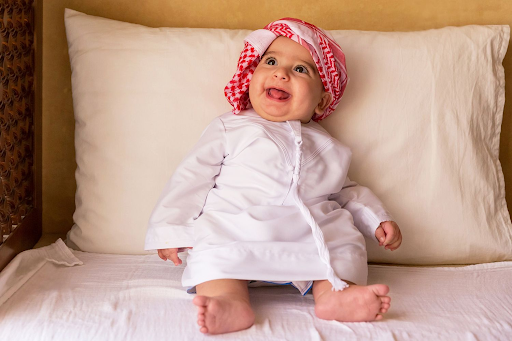Arabic baby names hold a profound cultural significance beyond mere labels. In the rich tapestry of Arabic-speaking societies, names are not just identifiers; they reflect deep-rooted traditions, religious values, and historical legacies. In this blog post, we embark on a cultural exploration of the significance behind Arabic baby boy names, unraveling the layers that make these names unique and meaningful.
Cultural and Historical Roots
The origins of Arabic names go all the way back to Arab history and culture. Many names have ancient origins, tracing their roots to the pre-Islamic era. Exploring these roots provides a fascinating journey through the cultural evolution of the Arab people.
From names inspired by nature, such as “Zahran” (meaning “blooming” or “flower”), to those reflecting noble virtues like “Kareem” (meaning “generous”), each name carries a historical context that connects the present to the past.
Meanings and Symbolism
One distinctive feature of Arabic baby names is the profound meanings they often carry. Unlike names in some other cultures, Arabic names are carefully chosen to convey positive attributes, virtues, or aspirations for the child.
For instance, “Rashid” means “guided” or “rightly guided,” emphasising the hope for the child to lead a righteous path in life. Understanding the meanings behind these names adds depth and intentionality to the naming process.
Religious Influence
Islam plays a central role in the lives of many Arabic-speaking communities, and this is reflected in the names chosen for their children. Names often draw inspiration from the Quran, with parents selecting names based on their religious significance.
Names like “Mohammed,” “Ali,” and “Omar” are not only popular but also deeply tied to Islamic history and traditions. Exploring the religious influence on Arabic boy names offers insights into the spiritual and moral values cherished by these communities.
Family and Ancestral Legacy
Arabic cultures place immense value on family ties and ancestral connections. Names are often passed down through generations, creating a sense of continuity and honouring the legacy of forebears.
The naming process involves a consideration of familial heritage, with parents choosing names that reflect their respect for lineage. This practice fosters a strong sense of identity and belonging within the family unit.
Modern Adaptations
While rooted in tradition, Arabic baby boy names also evolve to embrace modern sensibilities. There has been a shift toward names that resonate with contemporary trends and global influences in recent years.
Names like “Amir” (meaning “prince” or “leader”) and “Nael” (meaning “achiever” or “successful”) reflect a desire for modernity while still preserving the cultural essence of Arabic names.
Naming Ceremonies and Celebrations
Naming ceremonies are significant events in Arabic cultures, often accompanied by celebrations with family and friends. These ceremonies emphasize the communal aspect of naming, where the community comes together to bless the newborn and offer wishes for their future.
Exploring the rituals and traditions associated with naming ceremonies provides a glimpse into the social fabric of Arabic-speaking societies.
Closing Words
The significance of Arabic baby boy names is deeply embedded in the cultural, historical, and religious tapestry of the Arab world. Names are not arbitrary labels but reflections of rich heritage, religious values, and familial legacies. The cultural exploration of Arabic baby boy names unveils a profound connection between the past and the present, adding layers of meaning and intentionality to the names chosen by parents.
